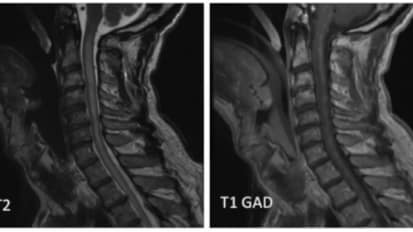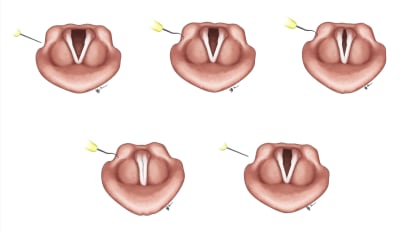Search
 Video
Video
High Risk for Breast Cancer: Methods and Schedules to Ensure Optimal Screening
Hematologist-oncologist Elham Vosoughi, MD, starts with an update on breast cancer stats, noting that incidence in the United States is increasing by 1% every year – with an even sharper rise for women under 50. News
News
Physical Activity May Still Not Match Pre-Covid 19 Pandemic Levels
Step counts—a measure of physical activity—were markedly lower early in the COVID-19 pandemic than pre-pandemic and remained lower, on average, in the two years following the onset of the global pandemic. Document
Document
Liver Transplant Program and Referral Information
With more than 13,000 people in the United States with end-stage liver disease awaiting a liver transplant,UCSF has made liver transplantation services a high priority. Video
Video
Multiple Sclerosis and Other Inflammatory Disorders of the Central Nervous System
Learn the latest thinking on MS and the genetic and environmental causes, preventing nerve loss in the brain and elsewhere, the role of vitamin D and UV exposure, breakthroughs on the horizon, and other inflammatory diseases like sarcoidosis. Video
Video
Focused Cancer Updates: Neoadjuvant Therapy for Breast Cancer and Managing Immunotherapy Toxicity
An expert panel delivers news to inform therapy and monitoring decisions, including a look at how the I-SPY 2 trial is accelerating evaluation of promising agents in high-risk breast cancer. Video
Video
Minimally Invasive TLIF; Techniques and Outcomes
Aaron J. Clark, MD, PhD, describes the minimally invasive approaches of transforaminal lumbar interbody fusion (TLIF) and its advantages over open TLIF surgery including the benefits for the obese and elderly, fewer complications and less pain. Video
Video
Constipation Frustration: How to Determine Therapy for a Diverse Diagnosis
A common disorder with a heavy socioeconomic burden, constipation has numerous causes and is described differently by different patients. Video
Video
A Lesson in Low Back Pain: Locate the Source
Sports medicine specialist Cindy Chang, MD, demos three tests to perform during a lumbar spine exam, to help you readily detect the main cause of discomfort. She also has a tip on what not to overlook. News
News
Tailored Deep Brain Stimulation Improves Walking in Parkinson’s Disease
UCSF researchers develop first-of-its-kind measure of gait performance, allowing researchers to fine tune electrical pulses to the neural network. News
News
UCSF Clinic Fills Unmet Need for Managing Oral Side Effects of Cancer Therapies
As advances in cancer treatments have expanded, so has the number of side effects that impact the mouth. Oral medicine specialists at UC San Francisco are working to mitigate these often-debilitating problems, which affect the majority of patients undergoing or recovering from cancer therapy. News
News
Genomic Sequencing Is Changing Diagnosis, Treatment for Patients with Brain Cancer
Patients diagnosed with a type of brain tumor survived for longer when they were treated aggressively with surgery, radiation and chemotherapy. Video
Video
Complex Drugs, Complex Patients: Navigating New Options for Diabetes Management
Robert J. Rushakoff, MD, helps providers get up to speed on the latest drugs, explaining benefits, crucial caveats, and factors ranging from expense to nonadherence. News
News
Brain Wave Recordings Reveal Potential for Individualized Parkinson’s Treatments
Pioneering neural recordings in patients with Parkinson’s disease by UC San Francisco scientists are providing the groundwork for personalized brain stimulation to treat Parkinson’s and other neurological disorders. Document
Document
Minimally Invasive Skull Base Surgery Center
The role of minimally invasive skull base surgery is expanding in the management and treatment of benign and malignant tumors of the paranasal sinuses, skull base and intracranial compartment. News
News
New Laryngopharyngeal Sensitivity Test Could Transform Patient Care
UCSF researchers have developed a first-of-its-kind technique to objectively evaluate laryngopharyngeal sensation. News
News
Can Lymph Nodes Boost the Success of Cancer Immunotherapy?
New data from a clinical trial show therapies may activate lymph nodes to produce tumor-tackling T cells. News
News
UCSF Cancer Researcher Thomas Martin Receives $4.6 million CIRM Grant
UC San Francisco’s Thomas G. Martin, MD, a leading expert in blood cancers, has received a grant of nearly $4.6 million from the California Institute of Regenerative Medicine (CIRM) to produce a CAR T cell therapy for multiple myeloma, the second most common malignancy among blood cancers. News
News
State-of-the-Art Weill Neurosciences Building Opens at UCSF
The Joan and Sanford I. Weill Neurosciences Building opened its doors in July 2021, establishing an innovative all-in-one hub for patients, researchers and clinicians at UC San Francisco’s Mission Bay campus. Video
Video
Common and Complex: Understanding Carpal and Cubital Tunnel for Better Management
In the time of COVID, primary care providers are seeing these complaints – and workers’ comp claims – virtually every day. News
News
First-of-its-Kind Amputation Prevention Center Offers Hope for the Toughest Cases
Rogelio Jacinto had five days until doctors planned to amputate his leg. It was an emotionally wrenching end to five months of unsuccessful visits to specialists to treat a diabetic foot ulcer. News
News
New Guidance for Reducing Medication-Related Dementia Risk in Patients With Overactive Bladder
This consensus paper is designed to update urologists and other healthcare providers who prescribe anticholinergics about the risks of these medications and help guide them on when to use anticholinergics and when it is appropriate to use alternatives. Video
Video
Detecting Less-Detectable Infections: A New Genetic Technique Using Plasma
Metagenomic next-generation sequencing can pinpoint pathogens causing infections in patients with immune function challenges and complex conditions, potentially saving lives as well as lowering care costs. News
News
Focused Ultrasound Technology May Overcome Barrier to Brain Tumor Treatments
The blood-brain barrier protects the brain from many viruses, bacteria, and other harmful small molecules that could be circulating throughout the body. However, this same barrier prevents many cancer therapies from reaching brain tumors. Video
Video
Cutting-Edge Approaches to Prostate and Breast Cancers: Reach the Right Decision for Each Patient
In this grand rounds presentation, you’ll learn the best risk assessment tools for prostate cancer patients, the latest surgical techniques, such as fluorescence imaging and high-intensity focused ultrasound, and tests that allow for matching patients with appropriate options.

